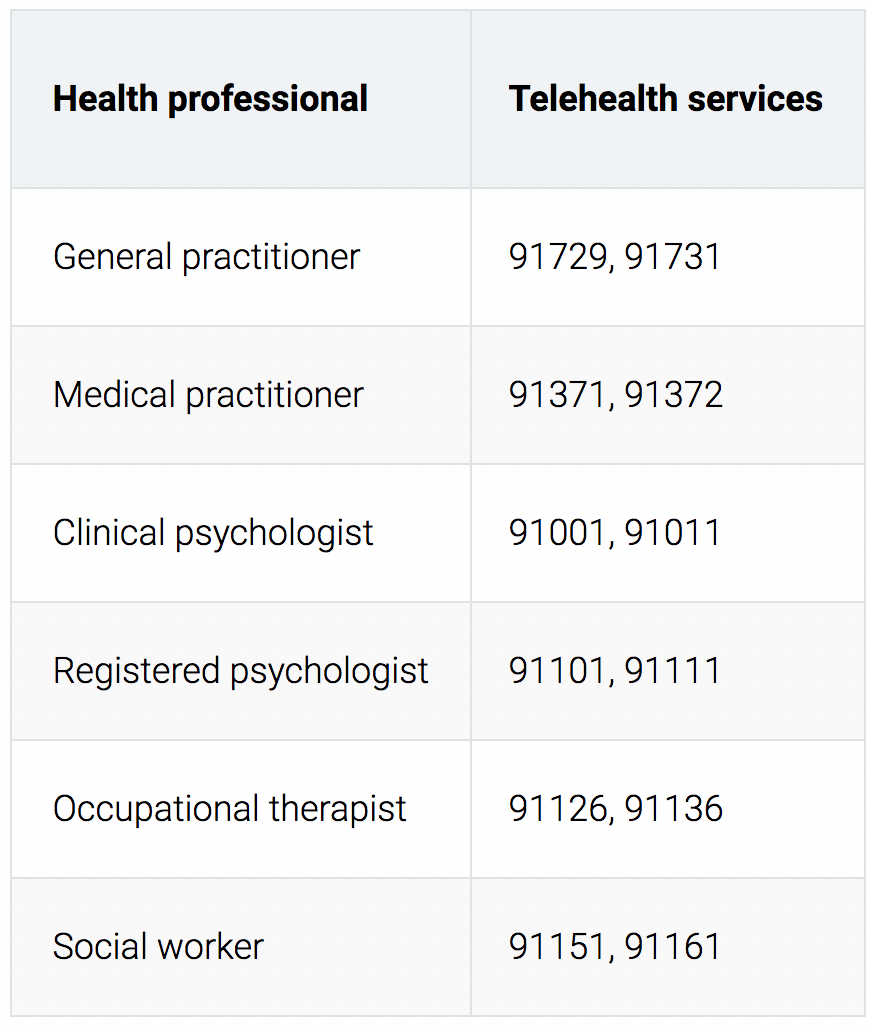Can I receive reimbursement for my telehealth video consultation?
There are a multitude of ways for both patients and providers to receive reimbursements for your consultations. We’ve collated the following information for you, to give you a better idea of what you may be eligible for.
New Reimbursements for Bushfire Victims:
Following the devastating bushfires that continue to burn across the nation, the government has responded with a mental health care package that extends the exisiting Better Access Scheme. $30m of the total funding is going directly to boosting telehealth services and increasing the amount of free psychological therapy sessions bushfire-affected people can access through Medicare.

Patients can claim up to 10 sessions and they do not need a referral. These items can be used in addition to the mental health care plan under the Better Access Scheme.
Medicare:
We have compiled a detailed list of MBS rebates available for GP visits, including the following:
1. Drought Affected Communities Programme
2. Better Access Scheme – GP Focussed Psychological Strategies (FPS)
3. Telehealth Patient-end Support Services
4. GP and non-specialist medical practitioner items for general attendance
Medicare has listed the MBS telehealth items that are available to specialists, consultant physicians and psychiatrists. Providers must meet all requirements listed to be eligible for these rebates.
The Australian Psychological Society has a detailed web page, outlining the requirements and availability of Medicare rebates for patients.
Under the Medicare Better Access Scheme, occupational therapists and social workers with focussed psychological strategy training can provide mental health services via telehealth.
MBS items listed for eligible patients.
MBS item listed for eligible dietitians and patients.
-
Patient-End Services (Scroll down to bottom of web page)
Medicare has listed the telehealth MBS items available to general practitioners, specialists, consultant physician, practice nurses, Aboriginal health workers, midwives and nurse practitioners via patient-end services. Health professionals that provide clinical support to their patients during video consultations with a specialist, consultant physicians and psychiatrists can claim these items.
Other organisations:
The CHSP is designed to provide financial support to older Australians who may need short term or basic ongoing assistance, but can generally manage on their own. Some services covered by the program include help around the house, transport, home modifications, meals, nursing and allied health care.
Allied health services such as physiotherapy, podiatry, nutritional advice and speech pathology as well as nursing services can be offered via telehealth technology, if this is appropriate for the care recipient.
The HCP provides a greater level of assistance and is designed to enable tailored, support packages to be created for the care recipient. There is a much larger pool of funding available, but recipients are means tested to determine their out of pocket cost. There are 4 levels of HCP funding, based on the needs of the individual.
The home care provider will work with the recipient to determine what services they need. Telehealth services are included in the HCP to ensure access to timely and appropriate care.
DVA is responsible for the ongoing support, compensation and commemoration of those who have served in the defence of Australia. Eligible patients can have their telehealth video consultations covered by the DVA.
The NDIS offers funding to individuals with a permanent and significant disability. It ensures they receive the care they need and attempts to reduce the financial burden on carers and families. The scheme covers a wide range of programs and services based on the individual’s circumstances and if the service is ‘reasonable and necessary’. This can include telehealth video consultations. Click here to learn more.
Carer Allowance is an income supplement that supports people who provide care in a private home to someone with an illness or disability. Often, family members become full-time carers and therefore cannot seek employment, meaning household income is reduced. This payment helps to lift the financial burden from carers and can provide a means to afford telehealth sessions, such as for speech therapy or physiotherapy. To determine your eligibility, click here.
Some private health insurance companies offer full or partial rebates for telehealth video consultations. Check with your provider to determine your eligibility.